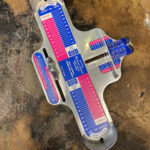Planning a trip to the Emerald Isle? Sorting out your finances is a crucial step before you embark on your Irish adventure. You’ve probably already looked into the best time to visit Ireland and started crafting your Ireland travel checklist, but one essential question remains: Does Ireland Accept Euros?
The answer, while seemingly straightforward, has a few important nuances depending on where you’re traveling within Ireland. Let’s dive into everything you need to know about currency in Ireland to ensure your trip is smooth and financially savvy.
Navigating Currency in Ireland: Euros and Beyond
It’s important to clarify that the island of Ireland is politically divided. This division also extends to currency.
The Republic of Ireland: This is where you’ll find major tourist hubs like Dublin, Cork, Galway, and the stunning Wild Atlantic Way. The official currency of the Republic of Ireland is the Euro (€). So, yes, Ireland does accept euros, and in fact, it’s the primary and widely accepted currency here. If your Irish itinerary focuses on exploring the Republic, euros are all you’ll need.
Northern Ireland: Part of the United Kingdom, Northern Ireland, home to Belfast, Derry, and the Giant’s Causeway, uses Pound Sterling (£), the same currency as the rest of the UK. Therefore, if your travels include Northern Ireland, you’ll need to be aware of and prepared to use Pound Sterling.
For most travelers focusing on the popular tourist trails within the Republic of Ireland, euros will be the only currency you need. Vagabond & Driftwood Tours, for example, primarily operate within the Republic, meaning euro is the currency for the vast majority of their tours. You only need to consider Pound Sterling if your itinerary specifically includes Northern Ireland.
Converting Currency for Your Irish Trip: Smart Strategies
While Ireland accepts euros in the Republic, the question of how to get your euros most efficiently is crucial. Converting your currency locally before you travel is generally the most cost-effective approach.
Avoid Airport and Tourist Hotspot Exchanges: Currency exchange desks at airports or in heavily touristed areas often offer less favorable exchange rates and may include hidden commission fees. These are convenient but come at a premium.
ATM Withdrawals in Ireland: A convenient option is to withdraw euros directly from ATMs upon arrival in Ireland (and pounds sterling in Northern Ireland). Most international debit and credit cards are accepted at Irish ATMs. However, be mindful of potential withdrawal fees charged by both the ATM operator and your bank. It’s wise to inform your bank of your travel dates to avoid any blocks on your card due to unusual international transactions and to inquire about international transaction fees beforehand.
Irish Banks and Post Offices: A Changing Landscape: Traditionally, banks and post offices were common places for currency exchange. However, recent changes in Irish banking policies mean that many banks now require you to be an account holder to exchange currency. Similarly, post offices generally do not offer dollar-to-euro exchange services. Therefore, relying on banks or post offices for currency exchange after arrival is no longer a recommended strategy.
Online Currency Converters: For up-to-date exchange rates, XE.com and similar online converters are excellent resources. Keep in mind that the actual rate you receive from a bank or currency exchange will likely include fees and may be slightly less favorable than the mid-market rate displayed on these converters.
Credit and Debit Card Usage in Ireland: What to Expect
Using credit and debit cards in Ireland is generally straightforward and widely accepted, particularly in tourist areas, larger towns, and cities.
Chip and PIN vs. Signature: Irish card payment systems are equipped to handle both chip and PIN and signature-based cards. While chip and PIN or contactless ‘tap’ payments are increasingly common, especially in a post-pandemic world, signature cards are still accepted. Inform service staff that you are on vacation and about your card type if they automatically expect a chip and PIN transaction.
Card Acceptance Limitations: While Visa and Mastercard are almost universally accepted in Ireland, some cards have limited acceptance. American Express (AMEX), Diner’s Club, JCB, and Discover cards are not as widely accepted in Ireland. If you primarily use American Express, it’s crucial to bring an alternative Visa or Mastercard for your Irish travels.
“Pay in Dollars” or Local Currency? Always Choose Euros (or Pounds): When given the option to pay in your home currency (like US dollars) or the local currency (€ euros or £ pounds) at a point of sale, always opt to pay in the local currency. Choosing to pay in dollars often involves unfavorable exchange rates set by the merchant or payment processor, costing you more in the long run.
Cash vs. Card in Ireland: Finding the Right Balance
Deciding between relying on cash or cards in Ireland depends on your spending habits and where you plan to travel. While cards are widely accepted, cash still holds its place, especially in certain situations.
Advantages of Using Cards:
- Convenience and Security: Cards are convenient to carry and generally safer than carrying large amounts of cash.
- Widely Accepted in Tourist Areas: Hotels, restaurants, shops, and attractions in tourist destinations readily accept cards.
Advantages of Having Cash:
- Smaller Establishments and Rural Areas: In smaller towns, rural areas, markets, and some independent shops, cash may be preferred or the only option.
- Tipping: While card tipping is becoming more common, cash is still appreciated for tips in certain situations (more on tipping below).
- Optional Activities and Incidentals: Some optional activities and small purchases are easier to pay for with cash.
Situations Where Cash is Recommended:
- Tips for Tour Guides and Activity Providers: While some may accept card tips, cash is generally preferred for tipping tour guides and for optional activities not included in your tour package.
- Smaller Shops and Markets: Independent shops in smaller towns, craft stalls in markets, and food trucks often operate on a cash-only basis.
- Buskers (Street Performers): Showing appreciation to street musicians and performers is typically done with cash.
- Backup: Having some cash as a backup is always wise, especially when traveling to more remote areas where ATM access might be limited.
Notify Your Bank Before Traveling: Crucially, inform your bank of your travel dates and destinations (including both the Republic of Ireland and Northern Ireland/UK if applicable) before you depart. This prevents potential blocks on your cards due to unusual international activity. Also, inquire about international transaction fees associated with your cards to avoid unexpected charges.
Budgeting for Your Ireland Trip: Estimating Daily Expenses
While Vagabond & Driftwood Tours cover your accommodations, breakfasts, transportation, guided services, and entrance fees to key attractions, you’ll still need to budget for additional expenses.
Daily Spending Considerations:
- Lunch and Dinner: Budget approximately €25 for lunch and a drink, and €35 for dinner and a drink per day. These are average estimates, and costs can vary depending on your dining choices.
- Optional Activities: Factor in an average of €25 per day if you plan to participate in optional activities. Some days might be cheaper, and some, like a boat trip or horseback riding, might be more expensive.
- Souvenirs: Allocate around €30 per day for souvenirs if you plan to purchase crafts, gifts, or mementos.
Sample Daily Budget (per person):
| Expense Category | Estimated Cost (€) |
|---|---|
| Lunch + Drink | 25 |
| Dinner + Drink | 35 |
| Optional Activity (avg) | 25 |
| Souvenirs | 30 |
| Total Per Day | 115 |
Dublin City Expenses: If you’re spending extra time in Dublin before or after your tour, factor in the higher costs of a major city.
Sample Dublin Budget (for two people, 2 days/1 night):
| Expense Category | Estimated Cost (€) |
|---|---|
| 4-Star City Hotel (double room) | 250-350 |
| 2 x Taxi Fares | 50 |
| Dinner and Wine | 120 |
| Lunch | 60 |
| 2 x One-Day Adult Dublin Passes | 148 |
| Total | 628-728 |
Dublin Hotel Costs: Expect to pay around €180-250 per night for a 4-star hotel in Dublin city center when booked in advance. Booking your Dublin accommodation well in advance, especially if your visit coincides with major events, is highly recommended.
Saving Money in Ireland: Budget-Friendly Tips
Traveling to Ireland doesn’t have to break the bank. Here are some cost-saving strategies:
- Airbnb: Consider Airbnb for accommodation, particularly in Dublin, for potentially lower rates compared to hotels. Staying slightly outside the city center can also reduce costs.
- Stay Outside City Centers: Hotels and B&Bs outside major city centers like Dublin often offer more affordable rates. Dublin’s public transportation makes it easy to access the city center from surrounding areas.
- Economical Dining: Opt for deli sandwiches or rolls for lunch (€4.50-7). Pub grub menus (€12-18) and early bird restaurant specials (around €30 for two) offer good value for dinner.
- Maximize Breakfast: Take advantage of the hearty hot breakfasts included in Vagabond & Driftwood tours. These substantial breakfasts can often tide you over until dinner, reducing lunch expenses.
Tipping in Ireland: Understanding Irish Gratuity Customs
Tipping customs in Ireland differ from places like the US or Canada. It’s less ingrained and generally more moderate.
Restaurant Tipping: Leaving a 10-15% tip in restaurants is customary for good service, but not mandatory. Tips above 15% are typically reserved for exceptional service or large groups. Always check your bill for a service charge, as this means a tip is already included.
Pub Tipping: Tipping bartenders in pubs isn’t expected for individual drinks. However, it’s appreciated when buying rounds, for complex cocktails, or at the end of a longer evening.
Taxi Tipping: Tipping taxi drivers is not obligatory, but rounding up the fare to the nearest €5 or €10 for friendly and helpful service is a nice gesture.
Tour Guide Tipping: Tipping tour guides is customary and appreciated, usually at the end of a tour. A common industry standard is around €15 per person per day, but the amount is always at your discretion based on the service provided.
When Tipping is Common:
- Restaurants (10-15%)
- Tour Guides (€15/day is industry standard)
- Hotel Porters (a few euros)
Tipping is Optional/Up to You:
- Taxis (round up)
- Cafes (loose change)
- Pub/Bar table service
Tipping is Not Expected:
- Bars (per drink)
- Hotel staff (except porters)
Irish Sales Tax (VAT): Prices are Inclusive
In Ireland, the price you see on the tag is the price you pay. Value Added Tax (VAT), the Irish sales tax, is always included in displayed prices. There are no surprise taxes added at the checkout.
VAT Refunds for Non-EU Visitors: If you are a non-EU resident, you may be eligible to claim back VAT on purchases made in Ireland. VAT rates vary but can be as high as 23%. Look into VAT refund schemes to potentially save money on your souvenir shopping.
Enjoy Your Euro-Fueled Irish Adventure!
So, to definitively answer the initial question: yes, Ireland accepts euros! Specifically, the Republic of Ireland, the destination for most travelers, operates using the euro. By understanding Irish currency nuances, planning your spending, and utilizing these tips, you’ll be well-prepared to enjoy a fantastic and financially stress-free trip to the beautiful Emerald Isle.


